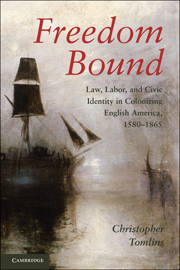Book contents
10 - Ending
“Strange Order of Things!”
Published online by Cambridge University Press: 05 June 2012
Summary
Jurisprudence is the knowledge of things divine and human,
The science of the just and unjust.
Bracton, De Legibus et Consuetudinibus Angliae (c. 1240)
It is the first of its kind;
it is an astonisher in legal history. [Laughter.]
It is a new wonder of the world. [Laughter and applause.]
Abraham Lincoln, Speech in Chicago, (1858)
Amazement is not the beginning of knowledge,
unless it is the knowledge
that the view of history which gives rise to it
is untenable.
Walter Benjamin, “Theses on the Philosophy of History” (c. 1940)
In March 1857, a half century after Benjamin Henry Latrobe’s extension to the original building had finally made room for the House of Representatives, the U.S. Capitol was again undergoing enlargement, this time to accommodate the gathering swarm of legislators that for years had been arriving in Washington from the states carved out of the new territories of the trans-Mississippi west. On the sixth of the month, fresh from Buchanan’s inaugural on the East portico two days earlier, a crowd gathered deep in the belly of the building to hear the justices of the United States’ Supreme Court pronounce judgment in a case addressing precisely the terms upon which westward movement would continue – Dred Scott v. Sandford.
- Type
- Chapter
- Information
- Freedom BoundLaw, Labor, and Civic Identity in Colonizing English America, 1580–1865, pp. 509 - 570Publisher: Cambridge University PressPrint publication year: 2010
References
- 1
- Cited by



